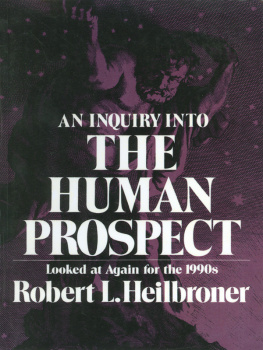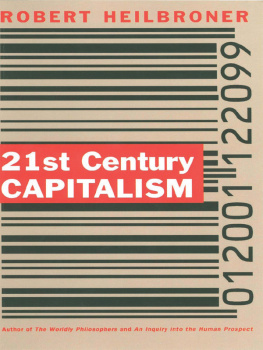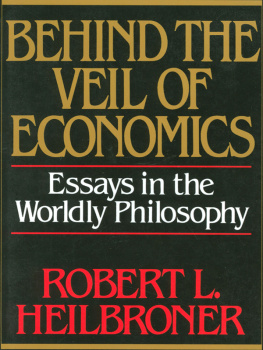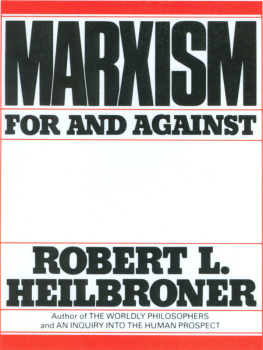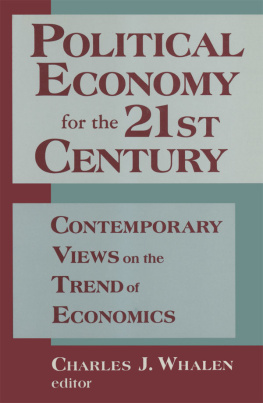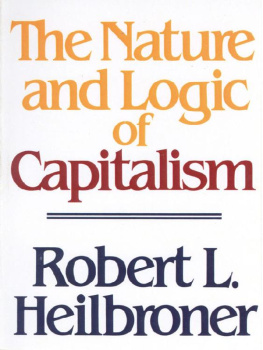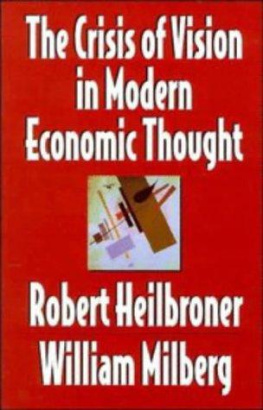
Books by Robert Heilbroner
Behind the Veil of Economics
The Debt and the Deficit
(with Peter L. Bernstein)
The Essential Adam Smith
The Nature and Logic of Capitalism
Marxism: For and Against
Beyond Boom and Crash
An Inquiry into the Human Prospect
Business Civilization in Decline
Between Capitalism and Socialism
The Economic Problem
The Limits of American Capitalism
Understanding Macroeconomics
A Primer on Government Spending
(with Peter L. Bernstein)
The Great Ascent
The Making of Economic Society
The Future as History
The Quest for Wealth
The Worldly Philosophers
Robert L. Heilbroner
AN INQUIRY INTO
The Human Prospect
Looked at Again for the 1990s

W W NORTON & COMPANY
NEW YORK LONDON
Copyright 1991, 1980, 1975, 1974 by W. W. Norton & Company, Inc. All rights reserved. What Has Posterity Ever Done for Me? Copyright 1975 by the New York Times Company. Reprinted by permission.
Printed in the United States of America.
ISBN 0-393-96185-0
ISBN 978-0-393-24261-4 (e-book)
W. W. Norton & Company, Inc.
500 Fifth Avenue, New York, N.Y. 10110
W. W. Norton & Company, Ltd
10 Coptic Street, London WC1A 1PU
Contents
An Inquiry into the Human Prospect was written between July 1972 and August 1973, a period only twenty years away that now seems light-years distant. Perhaps it can best be described as a time when a great national illusion was gradually destroyedthe illusion that an invisible shield surrounded the United States, like those force fields in science fiction. This shield, we believed, held at bay the brutalities and irrationalities that seemed to be part of the life of other nations, but not our own. It bestowed on American life an invulnerability against the ravages that history worked elsewhere in the world. It produced in us the mixture of innocence and assurance with which the best Americans faced the future, as well as the noisy arrogance with which the worst did.
During the period when this book was conceived, that shield gradually disappearedor rather, our belief in it evaporated. From our terrible experiences at home as well as abroad, from a smugness and mendacity in high government as demoralizing in their own way as the atrocities in Vietnam, came the slow realization that there was nothing outrageous or brutal in Africa or Asia or Latin America that could not also be found in the United States. During those years, the recognition dawned that the American way of life was no more exempt from erosion or obliteration than those of other nations; indeed, that by virtue of our prominence and wealth, our innocence and self-assurance, we were, in a sense, singled out for exposure to historys challenges.
I begin by harking back to the mood of puzzlement and despair that formed so important a part of the climate of the early 1970s because it had much to do with the reading, as well as the writing, of the Inquiry . Of course my readers questioned many things in its pages. Yet, there was one thing that no one called to account. This was the validity of the wager I made on the first page of the booka wager that a reader picking up my tract and facing its terrible opening question would not fling the book away in disbelief. The question asked: Is there hope for man? Whatever the reactions to the way in which I addressed myself to it, no one thought the query itself merely rhetorical or foolish.
Today, nearly two decades after that period of awakening, I speak to an audience that shares a distinctly different mood. Some of the challenges that were startling and disconcerting when the Inquiry first appeared have by now achieved a certain dullness of familiarity: it is no longer news that we face an energy crisisindeed, the recognition is gradually dawning that it is not a crisis from which, like a sick patient, we shall recover in due time, but a new condition, a permanent change in our capacities. Other problems have receded temporarily into the background: for instance, we have become inured to the spread of nuclear weaponry to minor countries, a matter of head line significance when the Inquiry was being written and India, to worldwide consternation, detonated an atom bomb.
Most important of all, the attitudes of innocence and assurance that were then under such painful attack have by now achieved an almost antiquarian status. Is it impossible that only twenty years ago most Americans fervently believed that their government would never tell a lie? Is it credible that we used to talk seriously about Americas unchallengeable global power? This is some measure of the distance we have come, or of the depths to which we have fallen, or of the progress we have made, depending on how you look at it.
At any rate, the change in our perceptions has influenced the manner in which I have approached the task of updating The Human Prospect . As its new subtitle indicates, I have tried not merely to make it more current, but to reconsider itthat is, to reflect back on the plausibility of the original arguments from the altered vantage point of the impending decade. For this reason I have decided to leave the original text alone, trifling changes aside. Instead, following each chapter I have added an Afterword, where I can scrutinize the facts and the train of thought, not only to make corrections where these are needed, but to try to bridge the gap between the mood I shared with my original readers and the different mood of today.
My book has had the good fortune to remain contemporary for almost two decades. I hope that this new inquiry into the Inquiry will extend that contemporaneity for a little while longer, events permitting.
* * *
I must make a confession: I have updated the Foreword above to make it read as if it had been written in 1973. Actually it prefaced the edition issued for the 1980s. The reason for the updating is that it is now 1990 and time for another look, but it seemed awkward to add third thoughts to second ones: how many chances should an author be given to change his mind? What I have done, then, with one exception is to leave things as they were, adding only the briefest comments to bring the story up to date. The comments themselves are easily identifiable by their typeface and the asterisks that precede them. The one exception, however, warrants comment. It concerns the extraordinary political year 1989 in which communism vanished like a puff of smoke. The most important political event of the twentieth century was foreseen by no one .
Does not that fact in itself call into question the credibility of a book that pretends to spell outor at least to inquire intothe prospect for humanity? I will not address that question until the Afterword to Chapter Three (p. 111), which I have rewritten in entirety for the occasion. That new afterword, and the brief comments added to earlier chapters, are the full extent of the changes that will give this book whatever further contemporaneity it may deserve .
ROBERT L. HEILBRONER
March 1991, New York City
THERE IS A question in the air, more sensed than seen, like the invisible approach of a distant storm, a question that I would hesitate to ask aloud did I not believe it existed unvoiced in the minds of many: Is there hope for man?
In another era such a question might have raised thoughts of mans ultimate salvation or damnation. But today the brooding doubts that it arouses have to do with life on earth, now, and in the relatively few generations that constitute the limit of our capacity to imagine the future. For the question asks whether we can imagine that future other than as a continuation of the darkness, cruelty, and disorder of the past; worse, whether we do not foresee in the human prospect a deterioration of things, even an impending catastrophe of fearful dimensions.
Next page
